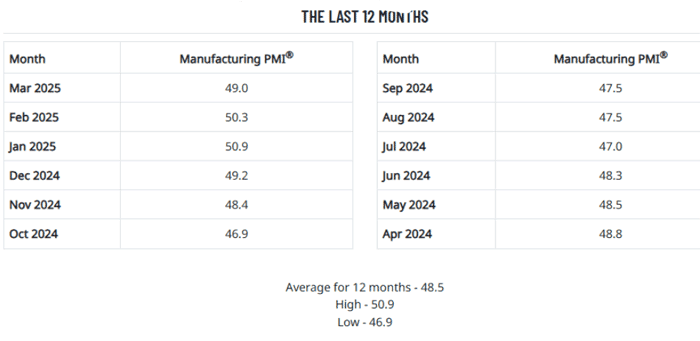The US Purchasing Managers Index (PMI) for March was released this week by the Institute for Supply Management (ISM), and came in at a level of 49.0, down from 50.3 in February, falling below the key 50 mark that separates US manufacturing expansion from contraction, after two short months of expansion.
Supply Chain Digest Says... |
 |
|
| In March, however, all markets saw a slowdown, with fear and inventory stocking to hold through a potential crisis.” said one manager in chemicals sector. |
|
 |
|
What do you say? |
|
| Click here to send us your comments |
|
| |
|
| Click here to see reader feedback |
|
|
|
Those two months of manufacturing expansion came after a long 26-month stretch of contraction.
However, ISM says that the overall economy continued in expansion for the 59th month after one month of contraction in April 2020. The PMI itself tracks closely but not exactly with the overall US economy.
A Manufacturing PMI above 42.3, over a period of time, generally indicates an expansion of the overall economy, according to ISM.
The other PMI numbers we track were mostly down.
The New Orders Index was again in contraction territory, registering 45.2, which was 3.4 percentage points lower than the 48.6 recorded in February, in bad news for future US manufacturing activity.
The March reading of the Production Index (48.3) was 2.4 percentage points lower than February’s figure of 50.7, moving into contraction.
The Prices Index soared for the second straight month, registering 69.4, up 7 percentage points compared to the reading of 62.4 in February. That means companies saw increased costs for components, materials and other inputs for the sixth straight month in March (above 50 = rising prices).
However, the Backlog of Orders Index registered 44.5, down 2.3 percentage points compared to the 46.8 recorded in February, indicating order backlogs contracted for the 29th consecutive month after a 27-month period of expansion, with the index level still well below the 50 mark.
The Supplier Deliveries Index indicated continued slowing of deliveries (though at a slightly slower rate of change), registering 53.5, 1 percentage point lower than the 54.5 percent recorded in February.
Supplier Deliveries is the only ISM index that is inversed, with a reading of above 50 indicating slower deliveries, which is typical as the economy improves and customer demand increases - or the reverse.
The Inventories Index registered 53.4, up 3.5 percentage points compared to February’s reading of 49.9. The index returned to expansion after six months of contraction, meaning companies in total added inventory in the month.
Said Timothy Fiore, Chair of the Institute for Supply Management Manufacturing Business Survey Committee: “Demand and production retreated and destaffing continued, as panelists’ companies responded to demand confusion. Prices growth accelerated due to tariffs, causing new order placement backlogs, supplier delivery slowdowns and manufacturing inventory growth. 46% of manufacturing gross domestic product (GDP) contracted in March, up from 24 percent in February.”
(See More Below)
|
CATEGORY SPONSOR: SOFTEON |
|
|
|
|
|
As always, the ISM report provides a graphic of the PMI scores for the last 12 months, which as can be seen show the two months over 50 in January and February after a long stretch of contraction since November 2022. It is now averaging just 48.5 over the past year.

Source: ISM
Of the 18 sectors tracked by ISM, nine reported growth in March. Listed in order they are: Textile Mills; Petroleum & Coal Products; Fabricated Metal Products; Primary Metals; Computer & Electronic Products; Nonmetallic Mineral Products; Transportation Equipment; Electrical Equipment, Appliances & Components; and Miscellaneous Manufacturing.
As always, there were some interesting comments from PMI survey respondents.
“Complex markets saw a surge in volume buying in anticipation of 2025 being slightly better than 2024. In March, however, all markets saw a slowdown, with fear and inventory stocking to hold through a potential crisis.” said one manager in chemicals sector.
Another manager in the computers and electrics sector stated that “Customers are pulling in orders due to anxiety about continued tariffs and pricing pressures.”
Finally, a manager in the machinery industry noted that “Business condition is deteriorating at a fast pace. Tariffs and economic uncertainty are making the current business environment challenging.
What are your thoughts on this ISM PMI? Let us know your thoughts at the Feedback section below.
Your Comments/Feedback
|

